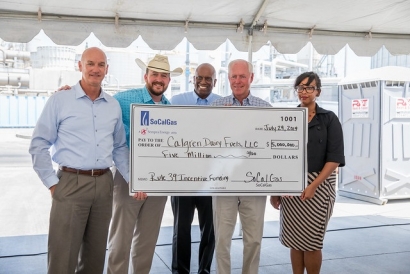
At the new facility, Calgren collects cow manure – a potent source of greenhouse gas emissions - from four local dairy farms and processes it in an anerobic digestor that accelerates the natural decomposition process.
Methane emissions from that process are captured and converted to make renewable vehicle fuels. The renewable natural gas (RNG) is then injected into the SoCalGas pipeline system which allows Calgren to supply RNG to existing compressed natural gas (CNG) refueling facilities. Ultimately, this also has the potential to be delivered to customers to fuel ultra-low emissions trucks and buses, generate clean electricity, and heat homes and businesses.
Calgren plans to partner with eight additional dairy farms by the end of 2019, which will make the facility the largest dairy biogas project in the nation. At the ceremony marking the completion of the project, SoCalGas presented Calgren with a $5 million incentive check authorized by the California Public Utilities Commission to support the development of renewable energy projects.
"This facility alone will eventually capture methane produced from the manure of more than 75,000 cows, preventing about 130,000 tons of greenhouse gas from entering the atmosphere each year, the equivalent of taking more than 25,000 passenger cars off the road for a year," said Walt Dwelle, principal owner of Calgren Renewable Fuels.
RNG is a renewable fuel produced from food waste, farms, landfills, and even sewer systems. Over the last five years, RNG use as a transportation fuel has increased 577 percent, helping displace over seven million tons of carbon dioxide equivalent (how greenhouse gas emissions are measured).
SoCalGas is working to make RNG available to fuel the homes of the company's 21 million customers across Southern California. The company recently filed a request with the CPUC to allow customers to purchase renewable natural gas for their homes. SoCalGas seeks to have CPUC approval of its voluntary program by the end of the year.
Using RNG in buildings can be two to three times less expensive than any all-electric strategy and does not require families or businesses to purchase new appliances or take on costly construction projects.
"Renewable natural gas is a smart way to address climate pollution," said Assemblymember Devon Mathis (26th District). "It not only helps develop new businesses and economic opportunities, it also reduces emissions while allowing people to keep the option of using gas for home heating, cooking and other needs."
The dairy digesters in the Calgren project and others like it are also partly funded under California's Dairy Digester Research and Development Program, which aims to reduce greenhouse gas emissions from manure generated at state dairy farms. The state currently has about 30 operational dairy RNG projects and 50 more in various stages of development that will result in more than 50 million metric tons of greenhouse gas reduction (CO2e) over the next 20 years, according to the industry group Dairy Cares. Experts estimate as many as 120 projects could be funded and operating in the next five years.

